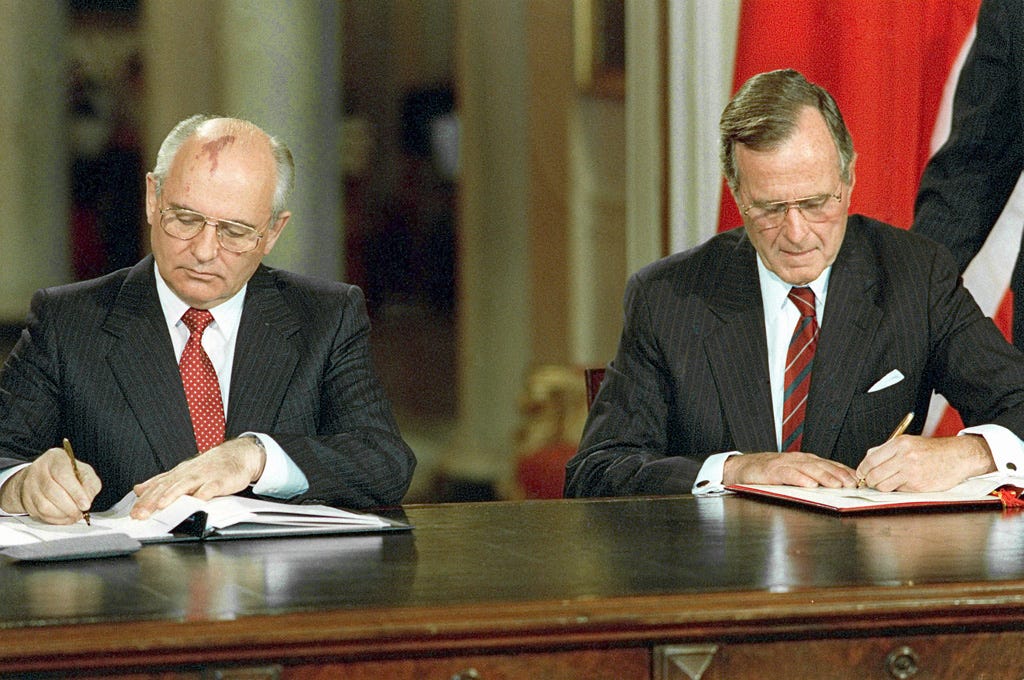End of an era
Russia mourns Mikhail Gorbachev, the last leader of the Soviet Union, who attempted to change his country, but instead changed the world
Mikhail Gorbachev, the first president of the Soviet Union and the last General Secretary of the Communist Party’s Central Committee, is celebrated as a leader who brought hope for a dialogue and rapprochement among the superpowers some three decades back.
While seen as a peace ambassador abroad, he is largely viewed as an iconic but all the more complex and controversial historical figure at home.
“We are living in a new world. The Cold war is over, the arms race and the insane militarization of the country, which has scarred our economy, public consciousness and morality, have been stopped. The threat of world war has been removed,” Gorbached said in his farewell address on December, 25, 1991.
His demise on the night of August 30, 2022 in Moscow is seen as an extremely symbolic end of an era that practically ended some six months back with Russian troops marching into the territory of Ukraine and global leaders unleashing nuclear threats.
"Mikhail Gorbachev was a politician and statesman who had a huge impact on the course of world history. He led our country during a period of complex, dramatic changes, large-scale foreign policy, economic, and social challenges”, Russian President Vladimir Putin reacted on Wednesday early morning before condolences started pouring in from all corners of the globe.
To make sure, Putin, who served in KGB, a powerful security agency of the Soviet Union during Gorbachev’s time as leader, made it clear in many statements, particularly recent ones, that he saw the dissolution of the Soviet Union and the collapse of the Eastern bloc in Europe as humiliating to Russia.
“Gorbachev gave impetus to the end of the Cold War, and he sincerely wanted to believe that it would end and an eternal romantic period between the new Soviet Union and the West would come. This romanticism was not justified, no romantic honeymoon did not work out, the bloodthirstiness of our opponents showed itself," Kremlin’s spokesperson Dmitry Peskov commented, even as he noted that Gorbachev was “statesman who will forever remain in the history of our country”.
The head of the Foreign Intelligence Service, Sergei Naryshkin reminded that today Russia deals with the consequences of "Perestroika”.
“Gorbachev had to lead the country in a very difficult period, to face a lot of external and internal challenges, an adequate answer to which was not found. Now God is his judge. And the period of "perestroika" and the subsequent collapse of the USSR will remain the subject of deep research by historians, political scientists, and lawyers for a long time," he noted.
Most of the commenters, from top government leaders and politicians, to journalists and businessmen refrained from judgments of Gorbachev’s leadership and praised him as a “large-scale personality” who stood at the origins of many transformations, and “emerged as a face of global changes that took place in Russia and the world”, as Russia’s Prime Minister Mikhail Mishustin had put it.
"Gorbachev gave us freedom. He gave freedom to hundreds of millions of people in and around Russia, and also to half of Europe. How we in Russia took advantage of the freedom given to us, this great opportunity, is our responsibility <...> Few leaders in history have had such a decisive influence on their time. In six years in power, Mikhail Gorbachev has changed the world," Grigory Yavlinsky, the founder of Russia’s liveral Yabloko party stated.
“There were many great achievements during the Soviet Union, among which, first of all, were vistroy [in WW2] and [conquering of] space. But if these victories were systemic, it was thanks to the efforts of the people, and not an achievement of the Soviet system. <...> It was Gorbachev who broke the system that was initially faulty and which eventually degenerated into an anti-national one," Konstantin Kosachev, Deputy Speaker of Russia’s Federation Council ( the upper house of parliament) said.
One of the most outspoken journalists in the country, Dmitry Muratov, editor-in-chief of Novaya Gazeta who was co-awarded the 2021 peace prize last for defending freedom of expression in Russia, reminded that Gorbachev despised war and real politics.
“I heard that he managed to change the world, but failed to change his country. Maybe so. But he gave both the country and the world an incredible gift — he gave us thirty years of peace. Without the threat of global and nuclear war. Who else is capable of such a thing? However [...] The gift is no more. And there will be no more such gifts," he wrote in an emotional message on the newspaper’s website. Novaya Gazeta suspended its operations in March, shortly after Russia's invasion of Ukraine.
Andrey Makarevich, an iconic singer who criticized Russia’s actions in Ukraine and fled Moscwo to Israel said Gorbached did everything “to make Russia equal among equals, free among the free”. But Russia wasn’t ready, the musician believes. “Those who threw mud at him didn't even realize how much good he had done for them, too. The miracle didn’t last, and the country has gradually returned to its usual state,” Makarevich concluded.



